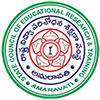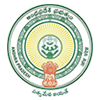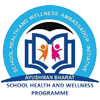About Us
Operationalizing the School Health and Wellness Programme (SHWP) in Andhra Pradesh
Preparatory phase
The School Health and Wellness Programme (SHWP) was launched on 24 February, 2021 by the State Council of Educational Research and Training (SCERT), Andhra Pradesh (AP), in close collaboration with Department of Health and Family Welfare (DHFW), Government of AP, and with technical assistance from United Nations Children’s Fund (UNICEF).
It was initially envisaged as a pilot programme in the four aspirational districts. After the Commissioner of School Education, V. Chinaveerabhadrudu (IAS), encouraged the programme team to implement it across the state, the budget was partly enhanced with funds from DHFW. Along with bureaucratic and political will, the key reason for its successful and viable launch was that it was rolled out even during the pandemic as a virtual campaign with online trainings of trainers, teachers and ultimately children
The programme is being implemented in 12,533 schools.
- 10,932 Government and Zila Parishad High School
- 164 Model Schools
- 352 Kasturba Gandhi Balika Vidyalayas (KGBVs)
- 96 Backward Classes (BC) Welfare Schools
- 192 Scheduled Caste (SC) Welfare Schools
- 747 Tribal Welfare Schools
- 50 Andhra Pradesh Residential Educational Institutions Societies
Implementation guidelines developed
In order to prepare for roll out, state, district and sub-district level committees were formed. A series of stakeholder meetings were conducted by SCERT in close coordination with National Health Mission (NHM), AP State AIDS Control Society (APSACS) and UNICEF.
SHWP school kit
- 55 videos related to 11 Modules
- Short films, role play demonstrations
- Concise handbook for children on 11 modules
- 2 banners
The kits were given to all schools in the state and were further shared with 5 Regional Institutes of Education, 36 SCERTs across the country, AP Department of Health, GoI and UNICEF
A detailed project implementation plan was developed in a consultative manner. Translation of the 11 SHWP modules was completed between Oct 2020-March 2021 by the SCERT team and the printed modules in Telugu were distributed across 12,533 schools in the state.
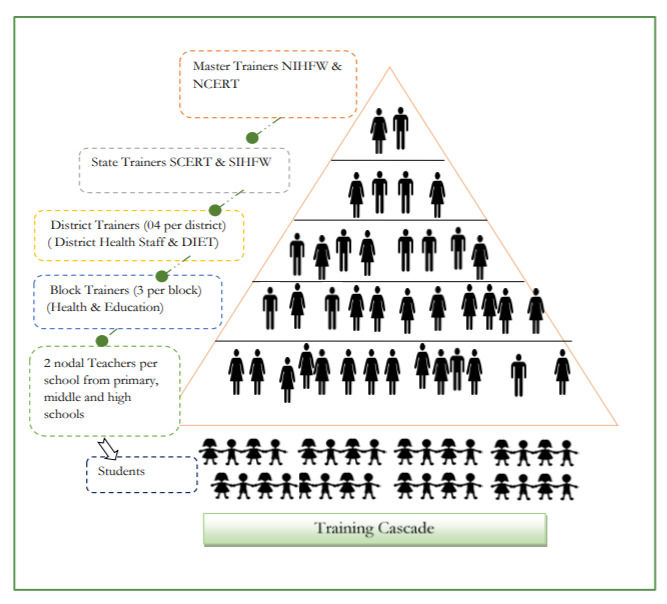
Cascade training conducted
The training was conducted in cascade mode to cover the 11 modules and 55 videos developed as part of the communication package. It was helmed by the state level Master Trainers from SCERT who had been trained at the national level by master trainers from National Council of Educational Research and Training (NCERT) and National Institute of Health and Family Welfare (NIHFW).
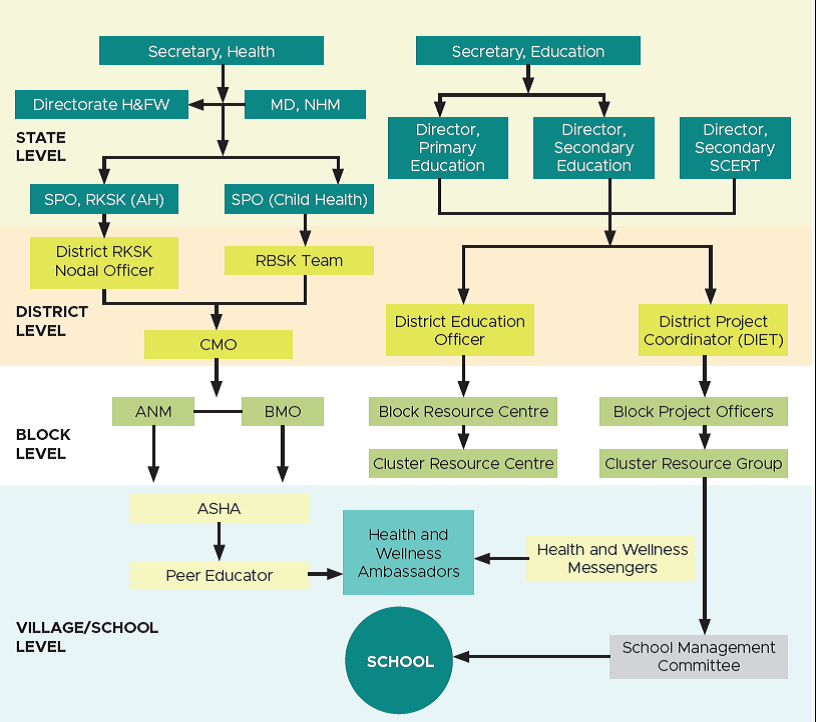
These MTs then trained school teachers at the Mandal Level between Feb 24-26, 2021. The schools trained included Zila Parishad (ZP), government, residential, tribal and Backward Classes (BC) Welfare schools and Kasturba Gandhi Balika Vidyalayas (KGBVs).
Mandal level trainings were conducted at Mandal Resource Centres (MRCs) where teachers from the Mandal would gather (one principal, one biology teacher and one physical training teacher per school). Mandal Educational Officers (MEOs) held the responsibility for taking biometric teacher attendance and coordinating for the online training. Approximately 30 teachers participated in the training at each MRC. Of the targeted 18,128 teachers, 80% were trained and the remaining will be covered in subsequent sessions. The trained teachers further imparted training to 70% of the targeted 13, 65,328 students from classes 6-12.
Monitoring and supervision of trainings
State level mentors from SCERT, NHM and UNICEF extended monitoring and supervision support to state and district level trainings. Standardised GoI formats were used for field level training monitoring and some trainings were conducted again based on feedback.
Implementation phase
Programme structure and process operationalised
The Departments of Education, Health and AP SACS have played a pivotal role in revitalising the national level SHP and the Department of Health has provided support and issued clear guidelines on implementing the programme across all districts in the state. Coordination in terms of improving the quality of training has been done effectively to plan sessions for students. Further, convergence was ensured by involving Peer Educators of the RKSK programme in handholding SHWP activities and involving out-of-school children in the programme along with school going children. These strategic efforts served to keep the programme moving ahead and overcoming challenges, it is currently being implemented in full swing.
Reach of training cascade
- 4 state Master Trainers (MTs) trained at national level
- 39 district trainers trained at state level (3 per district)
- 10,705 Health and Wellness Ambassadors trained at Mandal level
- 9,55,730 children trained in schools
Roles and responsibilities of team
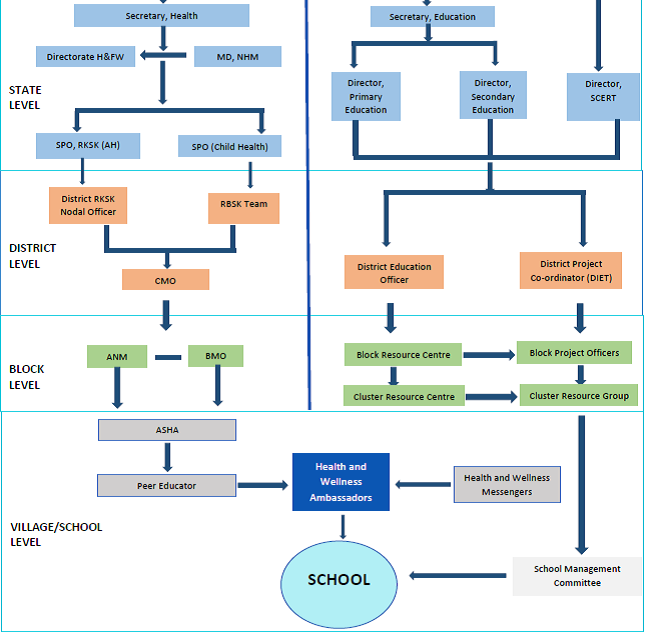
SHP monitoring system
The broad reporting mechanism of the SHP is as follows:
- Designated teams from MoHFW and MHRD will monitor activities by randomly visiting schools across all States/UTs.
- Officials from Health and Education departments will also designate teams/officials for field monitoring.
- The Block Medical Officer, BRC Coordinators from Education department, RBSK teams at the block level and Block Adolescent Health Coordinators will carry out programme supervision and monitoring on a periodic basis. District Nodal Officer may decide the periodicity of these visits.
- Block Adolescent Health Coordinators will ensure implementation of monitoring plan at the block level.
- Peer Educators will provide support to Health and Wellness Ambassadors at the school level.
Sustaining the momentum
Challenges and how they were overcome
- The programme resources were utilized optimally, within the budget and this was made possible because of concerted efforts of SCERT and the departnt of Health.
- State, district and block level task forces/committees came together and spearheaded the implementation.
- The risks posed by the COVID-19 pandemic, a significant challenge, were overcome by conducting virtual trainings.
- Teacher motivation which had dipped due to the pandemic was ensured through biometric attendance during trainings. Training quality was closelmonitored and trainings with lower quality were conducted again.
- During programme roll-out, Peer Educators of the RKSK programme provided support in handholding SHWP activities.
Successes
The SHP programme has been rolled out during a challenging period amidst the COVID-19 pandemic. However, through consistent efforts and cooperation, many good practices have been developed and adopted by the state during implementation:
- Unlike other states, SHP was undertaken in all districts and not just the aspirational district.
- There was optimal take up of all the teaching and learning methods utilised in the modules. Children enthusiastically participated in all the activies.
- Some modules have been included in the class 7 curriculum by SCERT.
- Around 44% of teachers took a post-test voluntarily in the HIV Prevention Module (Module 9) which was designed and conducted by SCERT/UNICEF (CDC PFAR project) and the results were satisfactory.
- Faculty members and students used diverse methods of teaching and learning. This included preparation of charts, posters, case studies, role plays, experience sharing and writing articles etc.
- Digital platforms such as Telegram and WhatsApp were extensively used to facilitate communication during implementation by government officis.
- Extensive media coverage of programme rollout at the school level was ensured on:
- Successful implementation of Ayushman Bharat in schools
- Monitoring of Ayushman Bharat training rollout
- Appreciation of school teachers and students during monitoring
- Sessions and role plays on topics such as substance abuse by students and taking care of one’s own health.
Way forward
The SHP was a uniquely planned state-level implementation of the national SHP and was successfully rolled out in spite of significant challenges. The programme has ensured that health and wellness of children and adolescents is a priority, which is especially crucial given the pandemic. The pace of implementation has been rapid and efficient and SCERT, NHM, APSACS, UNICEF and other key stakeholders have worked together in a coordinated manner to complete all the trainings for Health and Wellness Ambassadors and students as planned, and will strive to further strengthen implementation of SHWP in the state. There are also plans to develop a website for the state level SHP and a mobile app. The true success of the programme will be reflected when children translate the knowledge, they receive into action i.e., they seek health services and adopt healthy behaviours.
